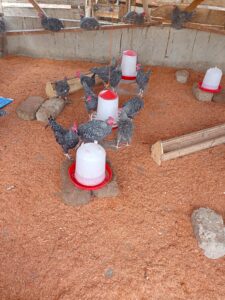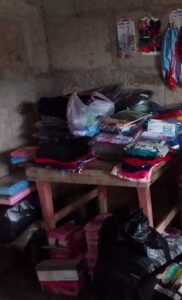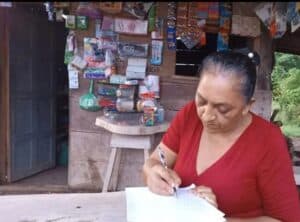
Agricultural Entrepreneurship Team Creates Demand for Orange-Fleshed Sweet Potato in Ashanti Region
By Bernard Frimpong Bannor – Agriculture & Entrepreneurship Program Officer

OFSP vines distributed to Beposo women.
In Self-Help International’s quest to alleviate hunger, research by Self-Help’s Ghana nutrition team in 2017 indicated that children, pregnant women, and lactating mothers in rural Ghana were particularly at risk for Vitamin A deficiency. In order to address this nutritional problem, Self-Help identified orange-fleshed sweet potato (OFSP) as a food-based intervention with potential long-term sustainability. As Self-Help’s team considered promoting the cultivation and consumption of OFSP as a solution, they identified two potential major challenges: the lack of access to quality planting materials in the Ashanti Region, and the possibility that people in the community wouldn’t adopt it since OFSP was a new crop.
Unfortunately, the initial attempt with specialists in the region to train farmers in Beposo for the 2018 major season failed to yield the desired results. The onus therefore fell on the Agricultural & Entrepreneurship Development team to make sure there was a sustainable supply chain, improved access to quality planting materials, and training to encourage Self-Help participants to adopt, consume, and make a business of OFSP.

Demonstration plot for OFSP multiplication.
In Self-Help’s effort to ensure sustained access to quality planting materials in thecommunities it serves, a demonstration field multiplication strategy was adopted. Self-Help procured 1,060 vine cuttings from Volta Region (232 kilometers away) through the Crop Research Institute to multiply at Self-Help’s Training Center in Nkwakrom for the 2018 minor season. Self-Help’s primary goal was to get enough quality planting materials to supply to at least all of the 59 pregnant and nursing mothers in the Beposo community working with Self-Help’s nutrition team.
In order to improve OFSP adoption and consumption rates, the Agricultural & Entrepreneurship Development team utilized farmer field days at the training center and collaborated with Self-Help’s nutrition team to provide practical guidance for the use of OFSP in local food preparation. Participants were invited to taste common local dishes prepared with OFSP in place of cassava or other starches to generate more demand for the crop.
Since November 2018, the demonstration field multiplication strategy has worked perfectly. The scarcity of quality planting material that could have potentially threatened the sustainability of the OFSP intervention in the communities Self-Help serves is a thing of the past. In fact, Self-Help currently has more than enough vines to supply to farmers at no cost. By the end of the second cultivation season, Self-Help was able to reach a total of 59 households in Beposo community and distributed more than 3,000 vine cuttings to farmers to ensure the multiplication of planting materials and the production of tubers for household consumption.

School children being served packaged OFSP juice.
With regards to consumption patterns and food tastes, Self-Help has successfully changed local norms. For the first time, over 101 participants (a combination of farmers, primary school children, teachers, and college students) present at the November 2018 farmer field day event at Self-Help’s training center were served locally prepared OFSP juice and porridge instead of conventional soft drinks – which are imported and less nutritionally beneficial.
“This juice tastes good. I would like to master the recipe so I can start making some for my family and friends,” said Annan, a 20-year-old student in her final year at Kwadaso Agricultural College.
Likewise, the farmers from Bedabour enjoyed the taste so much that they lamented that the 10 oz portion served to each participant was too small. Patience, a member of the nutrition team, taught participants about simple and indigenous recipes to try at home utilizing OFSP. Despite it being their first taste of OFSP, the majority of participants requested recipes and the planting materials before they left the training day.
The demand for the OFSP juice was very high among all age groups and the Self-Help team received positive reviews about it. Naturally, Self-Help hopes to develop more OFSP producers as the consumption rate increases. With a newfound taste for OFSP and demand on the rise, Self-Help is optimistic that the economic future for OFSP producers is very bright.

 Previous Post
Previous Post Next Post
Next Post


